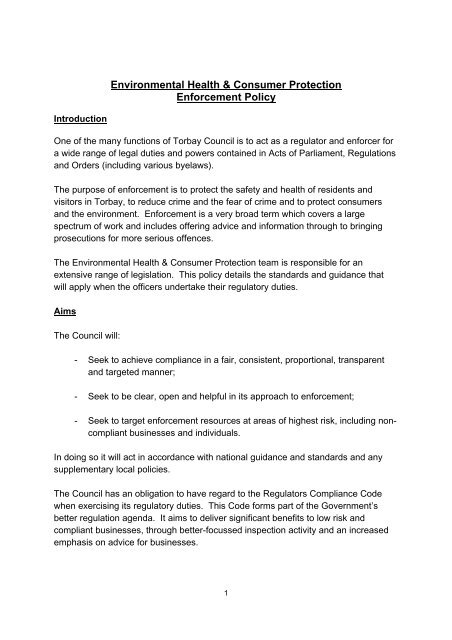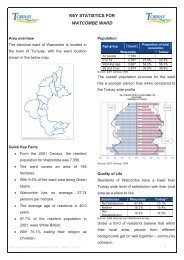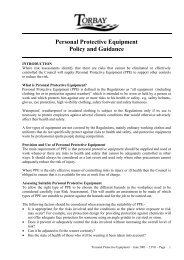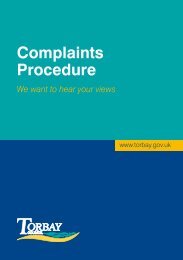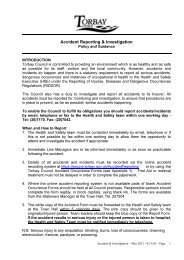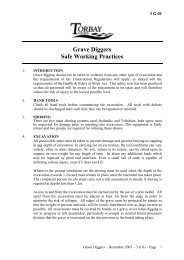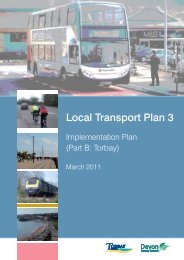Enforcement Policy - Torbay Council
Enforcement Policy - Torbay Council
Enforcement Policy - Torbay Council
Create successful ePaper yourself
Turn your PDF publications into a flip-book with our unique Google optimized e-Paper software.
Guiding PrinciplesThe Guiding Principles that the <strong>Council</strong> will have regard to when undertaking theirregulatory and enforcement role are:-• Any decision regarding enforcement action will be impartial and objective, andwill not be influenced by race, gender, politics, sexual orientation, disability orreligious beliefs of any alleged offender, victim or witness; Such decisions willnot be affected by improper or undue pressure from any source.• The <strong>Council</strong> believes that the majority of individuals and businesses wish tocomply with legal requirements, and should be assisted to do so;• We will give positive feedback, wherever possible, to encourage and reinforcegood practices.• In dealing with any enforcement situation, the <strong>Council</strong>’s actions will beproportionate to the scale, seriousness and intention of any non-compliance;• There will be consistency of enforcement, whilst recognising that there aredifferent, satisfactory solutions to each issue. We will refrain from being overprescriptivewhenever possible.• This policy is built around a process of escalation. Except in the most seriouscases or where advice/warnings have not been heeded, adequate opportunitywill be given to rectify non-compliance before formal legal action commences;• Prosecution will normally only be considered where it is in the public interest todo so and where there have been serious breaches or where otherenforcement measures have failed;• Regard shall be had to the relevant legislation and codes of practice whichprotect the rights of the individual and guide enforcement action (e.g. HumanRights Act, Code for Crown Prosecutors, Regulators Compliance Code);• Regard shall be had to the <strong>Council</strong>’s own policies in respect of CustomerCare, Equal Opportunities, etc.2
Clear Standards• Matters relating to enforcement and regulation will be dealt with promptly. Wehave set response times for dealing with complaints and requests for advice orassistance and aim to achieve those targets;• Officers will announce themselves on arrival at a premises, and showidentification (unless they are already well known to the person). Officers willalways explain the purpose of their visit;• Officers will provide their name and contact details to those persons orbusinesses with whom they are in contact concerning a regulatory orenforcement matter;• Complaints relating to enforcement or regulatory matters will normally only bedealt with if the name and address of the complainant is given. Any suchidentification will be treated in confidence, but may need to be disclosed (withprior consent) should formal legal proceedings be taken against the person orbusiness to which the complaint relates. Anonymous complaints mayhowever be investigated if the matter relates to serious health, safety orenvironmental issues etc.• Officers will not be able to act as consultants or legal advisors to individuals orbusinesses, but will be available (by appointment if necessary) to discussgeneral issues or matters of specific enforcement with the aim of assisting orguiding compliance;• Officers will be professional, courteous and helpful in their conduct ofregulatory or enforcement matters, and wherever possible will seek to workwith individuals and businesses towards compliance;• Officers will endeavour to provide advice in a clear and simple manner andwhere any corrective or remedial work is necessary, an explanation will begiven as to why it is necessary, and over what timescale it is required. Wherenon-compliance may result in further enforcement action or prosecution thematter will normally be confirmed in writing within ten working days, and anylegal requirements will be identified separately from best practice advice;• Where necessary, we will provide leaflets and other information in languagesother than English to assist individuals in complying with our requirements andrecommendations;3
• Officers will generally seek an informal resolution to cases of non-complianceexcept where immediate formal enforcement action is required (eg seriousissues relating to Health and Safety, Environmental Protection, evidencegathering etc);• Where there are rights of appeal against formal action, advice on the appealmechanism will be clearly set out in writing at the time the action is taken (egwhen the enforcement notice is served);• Where no statutory provisions apply you may have the right of appeal via aninternal <strong>Council</strong> process. We will inform you of that process.• Where there is known to be an involvement of any other enforcement agency,or any case involves joint enforcement arrangements, the <strong>Council</strong> will consultand share intelligence with that other agency prior to taking any formalenforcement action;• Where any charges or fees are to be levied for a service, individuals andbusinesses will be informed of the cost or rate of charge prior to the servicebeing provided;• Any dissatisfaction with the quality and/or advice given or any complaintconcerning the team’s failure to comply with procedures, rules, statutoryobligation or published service standards will be dealt with under the <strong>Council</strong>sCorporate Complaint procedure. Copies of this procedure are available fromoffices of the <strong>Council</strong>, or by accessing the <strong>Council</strong>’s Website(www.torbay.gov.uk) .ConsistencyConsistent enforcement action is desirable, but uniformity in approach would notalways recognise individual circumstances. We will encourage consistency ofapproach by:-• Providing appropriate training and supervision of officers;• Ensuring compliance with the standards set out in this policy;• Recognising that we should not normally take formal enforcement action orprosecution in the case of minor infringements;4
• Recognising that in some situations, we have no legal discretion but to serve aformal legal notice or pursue the collection of a fine;• Taking into consideration the guidance issued by Government Departmentsand other national agencies, eg Food Standards Agency, Health and SafetyExecutive, Local Authority Coordinators of Regulatory Services (LACORS),Gambling Commission, etc.Targeting and ProportionalityWe will not initiate formal enforcement procedures without a clear need to do so. Webelieve that through a positive, proactive approach, we can achieve highercompliance rates and better overall outcome than by using reactive enforcementaction.Any formal enforcement procedures will:• Aim to change the behaviour of the offender;• Aim to eliminate any financial gain or benefit to the individual or business fromnon-compliance;• Be responsive and consider what is the most appropriate sanction for theparticular offender and regulatory issue;• Be proportionate to the nature of the offence and the harm caused;• Aim to address the harm caused by regulatory non-compliance, whereappropriate;• Aim to deter future non-compliance.Our greatest inspection effort will be where risk assessment shows that both:(i) A compliance breach or breaches would pose a serious risk; and(ii) There is a high likelihood of non-compliance.We will use a comprehensive risk assessment to concentrate our resources on theareas of highest risk. Businesses and individuals we deem to be low risk orcompliant with legislative requirements will be inspected less frequently with a “lightertouch.”5
MonitoringTo ensure that this policy is effective, a number of monitoring and feedbackmechanisms will be utilised:-• Opportunities for businesses and members of the public to comment on thepolicy;• Utilise the results of National Indicator 182 on satisfaction of businesses withlocal authority regulation services;• Periodic consultation with business representatives, eg Licensees Forum andthe <strong>Torbay</strong> Development Agency.• Though open discussion with the public and elected members as part of the<strong>Council</strong>’s Performance Boards.Prosecution <strong>Policy</strong>The decision to prosecute is a serious one, having implications for the defendant, forwitnesses, sometimes for the <strong>Council</strong> and wider still, for the consistent and effectivemaintenance of standards. Prosecution will be considered only when:-- There is sufficient admissible and reliable evidence to provide a realisticprospect of conviction; and- It is in the public interest to do so.Prosecution will normally be in the public interest when one or more of the followingcriteria are satisfied:-(i)(ii)(iii)Unlawful acts or omissions have seriously or repeatedly compromisedpublic health, safety or the environment;The offending created/posed a risk to public health, safety or to theenvironment;Through blatant action or inaction risks causing suffering or increased riskof the spread of disease or pollution have been exacerbated;6
(iv)(v)(vi)(vii)(viii)(ix)(x)(xi)(xii)(xiii)Where there is disregard for safe practice;The offence involves a failure to comply in full or in part with a statutorynotice;Practices that cause, potentially cause or involve significant economicdisadvantage to consumers or businesses or significant gain to theoffender;The public have been or potentially could be misled by a false ormisleading statement or the offence involves dishonesty;The offender has relevant previous convictions or has been cautioned fora relevant matter;The offender has flagrantly breached the law or has ignored advice orrequests to remedy breaches of legal requirements;The offender obstructs an Officer of the Authority carrying out statutoryduties or where the offence involves the failure to supply information or thesupply of false or misleading information upon lawful request;The victim is vulnerable, eg a child or elderly person;The offence, whether or not serious in itself, is widespread in <strong>Torbay</strong>;The <strong>Council</strong> is under a statutory duty to enforce legislation.The above list is not exhaustive and the decision whether to prosecute will be takenhaving regard to the legal proceedings sheet and the individual circumstances ofeach case.Regard will be had to the Code for Crown Prosecutors at all stages of proceedings.7
Legal Proceedings Decision SheetFor Prosecution Against Prosecution Score1. Serious Incident Minor Incident2. Deliberate act or potential to causeinjury or damage through recklessdisregard.3. Inadequate control systems inplace.4. Previous advice already given tothe company / individual.5. Company/individual aware of therisk involved in their action.6. Management/supervisorresponsible for the incident.7. Poor confidence in management /individual.8. Previous prosecution for a similaroffence.9. No remedial action taken /proposed.10. Management / individualobstructive in the investigation.Unforeseeable/Accidental / Minorerror of judgementAdequate control systems in place.No precise information given byregulator previously.Company/individual could not havebeen aware of the risk involved intheir action.Employee or supplier responsiblefor the incident.Good confidence in management /individual.First offence.Remedial action already taken.Management / individual cooperativewith the investigation.11. Attempt to cover up the true facts. Attitude open and honest.12. <strong>Council</strong> reputation tarnished ifprosecution is not pursued.Prosecution may be seen as overzealous enforcement.8
13. Prosecution will secure definiteresults, e.g. protection ofworkforce.14. Prosecution will resolve animportant legal issue.15. Regulator identified problems on aprevious occasion.No obvious improvements instandards will result fromprosecution.Prosecution will not clarify a legalissue.Regulator did not identify problemson a previous occasion.If statements in column 1 are true, score -1.If statements in column 2 are true, score +1.If neither statements are true, or not applicable, score nil.A total minus score will favour a prosecution.However, a prosecution must be justifiable by a logical argument, including suchreasons as:-(i)(ii)the protection of employees or members of the public;to remedy deficiencies due to incompetent or irresponsible activities.9


